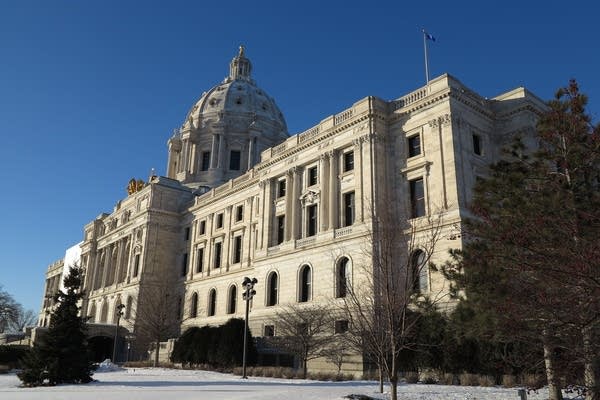New balance of power makes Republicans and Democrats wary

The Minnesota Legislature doesn't begin its new session for another six weeks, but some lawmakers are already speculating about the potential for a rocky conclusion by a divided government.
The decision by voters to end complete Democratic control of state government means that Gov. Mark Dayton and the DFL Senate must work with a Republican House to craft a two-year budget. Despite early pledges of cooperation, some lawmakers are worried about a state government shutdown.
Among them is state Rep. Greg Davids, R-Preston, who returns to a familiar role next year as chair of the House tax committee. He last held the title two years ago, during a biennium that included a budget stalemate between Dayton and the GOP majority that shut down government for three weeks in 2011.
• Related: As much as they dislike MNsure, Republicans may only tinker with it
Create a More Connected Minnesota
MPR News is your trusted resource for the news you need. With your support, MPR News brings accessible, courageous journalism and authentic conversation to everyone - free of paywalls and barriers. Your gift makes a difference.
"Well, it was a great political ploy by the DFL to regain the House in 2012," Davids said. "So, they may say, 'hey that's how we could take over the House again. Just have a shutdown and blame it on the Republicans.' I'm concerned about that."
Although Davids hopes he's wrong, he doesn't intend to let his concerns get in the way of crafting a tax bill that can pass in the House and Senate.
Senate Majority Leader Tom Bakk also is concerned about the ability of the two chambers to work together, mindful of the problems that occurred in 1985, the last time Minnesota had a Democratic governor, a DFL-controlled Senate and a Republican House.
"I would characterize it as kind of a disaster," Bakk said of that year's budget session, a decade before he arrived at the capitol. "It did not go well."
Bakk, who has studied that session, notes that lawmakers failed to pass any of their budget bills on time that year. They finished the job in late June during a three-day special session. Bakk called it a significant failure by that Legislature.
"My hope is that we can look back at that history," he said. "I've already told my leadership that I want a good summary written of that, because I don't want to make the same mistakes of 1985. The constitution says we meet from January to May, and my intent is to be done by the adjournment date in May."
The day after the election, Dayton warned that a shutdown could happen again, if Republicans are not willing to work with him. He said the new divided government is a prescription for gridlock unless they rise above it. Last week, Dayton was sounding a little more optimistic.
"The people of Minnesota have spoken. That's why we have elections," the governor said. "They've decided they want a Republican House and a DFL Senate and DFL governor. We'll make that work because we need to for the sake of Minnesota. We'll show Washington, D.C., how to do it right."
Lawmakers from both parties will have an easier time getting along if they have a budget surplus to work with. They'll find out more next week when state officials announce their latest economic forecast.
House Speaker-Designate Kurt Daudt, R-Crown, said he hopes nobody wants a government shutdown, and he's surprised anybody is talking about one at this point.
"If we focus on the problems that Minnesotans care about, and we focus on real solutions that will solve those problems, I don't see any reason why we would have a shutdown or why we wouldn't be able to work very well together," Daudt said. "So, I'm going to stick to that as we move through the session and hopefully the Democrats will remain focused on that as well."